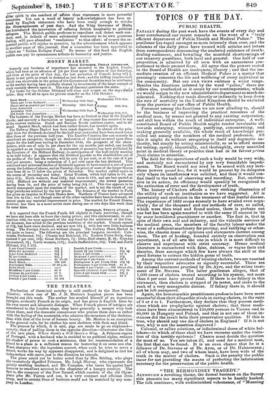THE THEATRES.
Production of theatrical novelty is still confined to the New Strand Theatre; where one of Mr. J. M. Morton's happiest pieces has been brought out this week. The author has availed himself of an ingenious intrigue, evidently French in its origin, and has given it English force by his own smart and idiomatic dialogue. When French pieces of intrigue are transferred to the London stage, they have generally a meagre wiry look about them, and the dramatic connoisseur who praises them does so rather with the feeling of the anatomist, who admires the structure of the skeleton, than with that of the lover of human beauty. Mr. Morton is an exception to the general rule, for he clothes his neat skeleton with flesh and blood. The process by which, it is said, pigs are made to go on shipboard— namely, that of pulling them in the opposite direction—illustrates the idea of the new piece, Where there's a Will there's a Way. A Princess-regent Of Portugal, with a husband who is entitled to no political rights, reduces his shadow of power to such a minimum, that his recommendation of a friend to a place is a snfficient 'reason for bestowing it on some one else. Want sharpens wit: the ingenious consort, when next he tries to serve a friend, works his way by apparent disapproval, and is delighted to find his independent wife move just In the direction he intends. The piece could not be better acted than by Mrs. Stirling, who plays the excessively dignified Princess, Mr. Leigh Murray, who represents the quietly exulting husband, and Mr. Compton, who turns his quaint hard humour to excellent account in the character of a hungry courtier. The fact is, the company of the New Strand; which consists of the old Olym- pians phis Mr. Farren and son, is a very compact and efficient little troop, zind-in certain lines of business could not be matched by any corn- party in London.


























 Previous page
Previous page